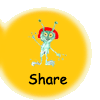
What's a Barycenter?
You've
no doubt heard that Earth revolves around the sun. Well,
actually, that's not quite true! Have
you heard the term "center of gravity"? It's a
technical-sounding term for something pretty simple. It's
the exact center of all the material (that is, mass) that
makes up the object. For example, if you have a straight
stick, like a ruler or yardstick, there's a place at the
middle where you can balance it on your finger. That's its
center of gravity. But
the center of gravity may or may not be the point that is
exactly in the middle, distance-wise, of the object. Some
parts of the object may be heavier (denser) than others. If
you have something like a sledge hammer that is heavier on
one end than the other, the center of gravity will be much
closer to the heavy end than the lighter end. To
get an idea of where the center of gravity is, rest the ends
of any object like the ruler or a pencil on one finger from
each hand. Slowly move your fingers together without
dropping the object. Your fingers will meet underneath the
object's center of gravity. You can balance the object on
one finger at that special place. The
actual center of gravity could be close to the surface or
deep inside, depending on whether the object is flat like a
ruler or a dinner plate, or "three-dimensional," like a box
or a ball. And if you let the object spin (like when you
throw it), it will try to spin about that point. In
the case of the Earth and the sun, both bodies actually
revolve, or spin, around the very center of the mass
(similar to center of gravity) between them. This point is
called the "barycenter." Earth and the sun are "connected"
by the gravity pulling them together. It's just like the
light end and heavy end of the sledge hammer. Compared to
the size of the sun, Earth is about like a flea on a cat! So
the center of mass between the Earth and the sun is
almost--but not quite--the very center of the
sun. In
the case of a planet the size of Jupiter, which is 318 times
as massive as Earth, the barycenter of Jupiter and the sun
is a bit further from the sun's center. So, as Jupiter
revolves around the sun, the sun itself is actually
revolving around this slightly off-center point inside
itself. Thus, a planet the size of Jupiter will make the sun
(or any star) appear to wobble a tiny bit. This picture
shows you that the center of mass and barycenter can be
slightly different points. It isn't meant to be very
accurate! We
can take advantage of this bit of knowledge and look for
large planets in other solar systems by learning to detect
this type of tiny wobble in the star's position. For
more on how we can do this, see Dr. Marc's amazing
fact about the StarLight
mission.



|
|
|||||





